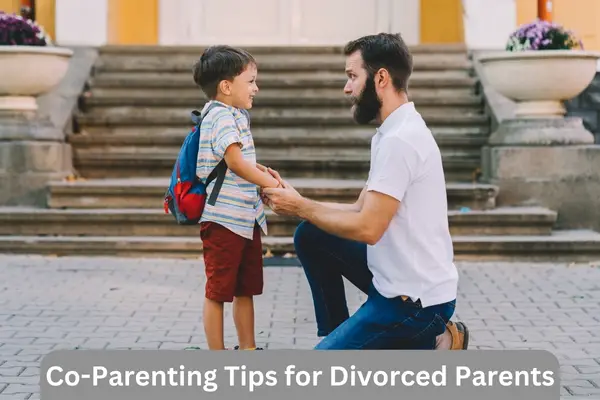Co-Parenting Tips for Divorced Parents
Going through a divorce is emotionally difficult for the entire family, especially when there are children involved. Learning to co-parent with your ex in a healthy way is crucial for your kids’ well-being after the separation.
Co-parenting requires plenty of patience, communication, and compromise from both parents. While it can be challenging to set aside your differences, keeping your child’s best interests at heart will help make joint custody easier and less stressful over time.
In this blog article, we will discuss and cover actionable tips to successfully co-parent with your ex-spouse once the marriage ends.
1. Establish Rules and Expectations
An essential first step after divorce should be to sit down with your ex and clearly define a co-parenting plan that outlines rules, schedules, and responsibilities for both parties when it comes to raising your kids.
Having set guidelines in writing that account for holidays, vacations, discipline methods, or medical decisions will minimize confusion and limit scope for conflicts in the future. Ensure your parenting plan is a legally binding document.
Some areas to address in your co-parenting arrangement could include:
- An agreed custodial schedule for physical and legal custody
- Transportation logistics and location exchanges for the kids
- Methods for resolving disputes or mediation processes
- Financial contributions towards the children’s expenses
- Rules about introducing partners to the children
You want your co-parenting agreement to be specific yet flexible enough to adapt as the family’s needs evolve over the years. Revisit this initial framework periodically to make modifications.
2. Maintain Open, Courteous Communication
Frequent and considerate communication is the cornerstone of cooperative co-parenting. Initiate conversations politely, using a friendly yet professional tone, to establish rapport with your ex when coordinating schedules or making child-related decisions together.
Share important updates about the kids’ lives, such as health conditions, progress reports from school, or notable social events via calls, texts, emails, or a shared digital calendar. Communicate changes to agreed schedules well in advance and offer alternative dates as needed.
Also, inform them about introducing any new significant others to the children per your arrangement. Maintaining healthy ongoing dialogue despite past grievances demonstrates your shared priorities lie with the children at the end of the day.

3. Allow Each Parent Time with the Kids
While negotiating custody, aim for compromises allowing substantial yet balanced time for both parents with the children, considering work schedules and locations. Kids benefit from quality time with each parent where they can participate in activities, traditions, or conversations that are unique to those relationships.
Whether the arrangement leans more towards sole physical custody with one parent or splits time equally, remember that kids need emotional connections with both mothers and fathers. Allow flexibility for each parent to be involved in important events like recitals, games, or milestone celebrations.
4. Be Supportive of Each Other’s Parenting
Of course, differences in parenting approaches or discipline styles that were irritants during marriage don’t disappear overnight. But criticizing your ex’s decisions will only lead to resentment.
As challenging as it might be, avoid undermining them, especially around the kids, even if you disagree with their rules or methods. Children may exploit tensions by playing parents against each other to get their way otherwise.
Also, check any impulse to overcompensate with gifts or leniency during your custodial time. Finding positive aspects of your ex’s parenting and communicating appreciation when warranted can go a long way.
5. Establish a Business-Like Rapport
Treating co-parent interactions like a business partnership focused on objective goals related to the children’s physical, emotional and financial needs prevents lingering romantic feelings or bitterness from sabotaging progress.
Limit private conversations, maintain professional distance, and keep face-to-face discussions kid-centric during custody transfers. Also, avoid using kids as messengers to indirectly communicate grievances to your ex.
If significant others are present, be cordial but steer clear of overly familiar exchanges recalling old memories. Defuse tensions promptly if they flare up and approach problems as shared concerns to resolve together, rather than accusations.

6. Agree to Disagree Respectfully
No matter the good intentions, disagreements between co-parents are inevitable over years of joint custody. Topics related to health, education, discipline, relationships, holidays, or expenses require compromises.
If you reach an impasse, take a time-out before continuing discussions once emotions have tempered and review your shared interests. Seek counselling assistance together if needed to mediate major conflicts.
The kids’ welfare depends on parents preserving mutual respect and sidelining ego. Agree to disagree politely on occasional issues without judgment and revisit difficult conversations only after tensions ease.
6. Support New Relationships Respectfully
While seeing an ex-spouse date someone new initially provokes jealousy, it is generally in a child’s best interests for parents to pursue fulfilled personal lives after separation.
Of course, integrating new partners into the family dynamic requires adjustment for kids too and can’t be rushed. As far as possible, be constructive rather than critical if your ex-spouse embarks on a new relationship.
Per agreed timelines, make introductions gradually while gauging your children’s reactions sensitively.
Offer them space to process complicated emotions without pressures to accept a new domestic situation immediately.
Above all, avoid confrontations or accusations about a new partner in front of the kids. Maintain maturity, take the moral high ground and reinforce that while family structures change, the love they receive remains constant.
7. Seek Support Groups for Divorced Parents
Joint custody presents emotional and logistical hurdles even in amicable divorces. Connecting with others navigating similar terrain provides reassurance you are not alone.
Local community centers, places of worship, parenting message boards, or social networks can offer access to formal or informal support groups for divorced moms and dads.
Besides fostering new friendships, these spaces allow healthy venting about common frustrations among peers. You also gain insider tips on enforcing boundaries, balancing duties or introducing partners from those further along the co-parenting journey.
Most importantly, support systems renew commitment when you feel discouraged and remind you to acknowledge efforts, however small.
8. Be United Yet Consistent with Discipline
Presenting a united front with your ex-spouse on discipline conveys stability to kids, especially approaching the tween and teenage years, even if techniques vary between households.
Agree not to rescind or reduce consequences for misbehaviors when children protest citing comparative leniency at the other parent’s home. Similarly, avoid dealing harsh punishments for infractions just prior to custody transfers.
For consistency, establish cooperative discipline through open communication between co-parents. Discuss behavior incidents individually with children as well, reminding them that while parents live apart, they continue to work together.
9. Make Special Occasions Meaningful
Holidays, vacations, or milestone events feel disrupted post-divorce due to juggling custody arrangements mixed with grief over the lost nuclear family dream. But concentrating on joyful traditions can establish new normalcy.
Brainstorm fresh co-parenting rituals the whole family looks forward to – maybe hosting a friendship Thanksgiving meal before a formal custodial swap or dedicating part of the kids’ birthdays for each parent.
Even if you can’t fully reconcile sentimental expectations of past anniversaries, adapt special occasions to focus on cherishing beautiful memories already shared over any regrets.
Conclusion
Learning positive co-parenting strategies enables divorced moms and dads to put personal conflicts aside and make joint custody succeed despite practical and emotional hurdles.
Approach scheduling gaps, disputes over rules, or navigating new partners patiently as shared parenting challenges rather than power struggles. Most importantly, keep the children’s developmental needs and family relationships at the core, however difficult sticking to amicable communication feels at times.


